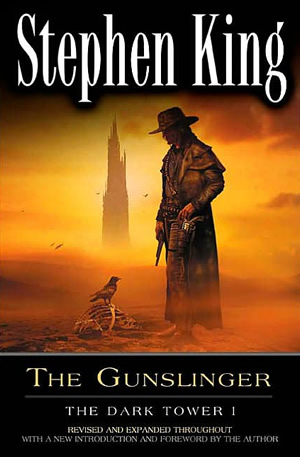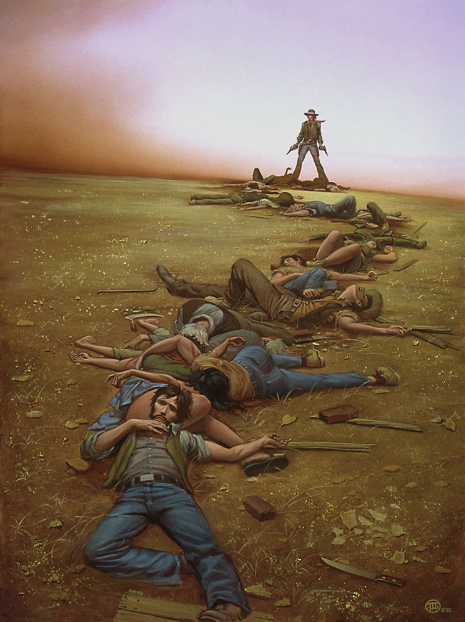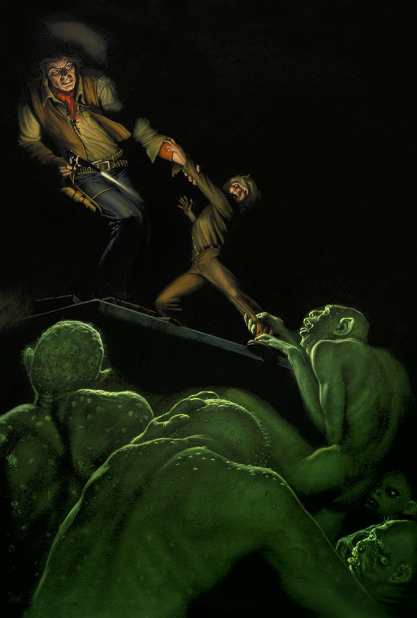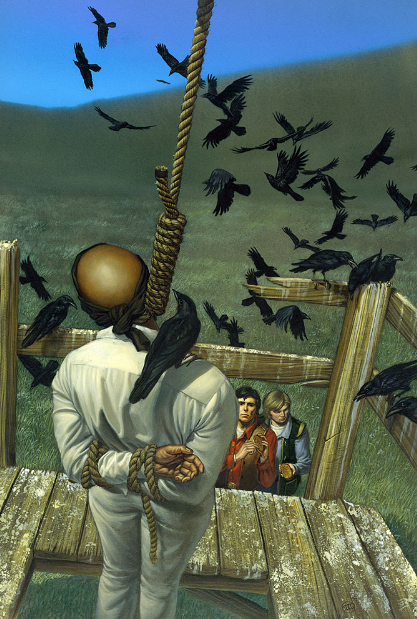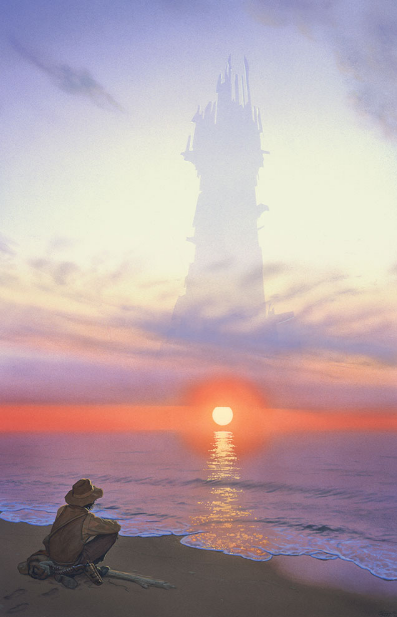In anticipation of Nikolaj Arcel’s upcoming screen adaptation of Stephen King’s The Dark Tower series (starring Idris Elba and Matthew McConaughey), the Deadshirt ka-tet of Max Robinson, Dom Griffin and David Uzumeri are taking a trip through the unique and sprawling fantasy/western novel series that inspired it.
An eight-book-and-change pillar that acts as a locus for the omniverse of King’s fictional output, The Dark Tower tells the story of Roland Deschain, the Last Gunslinger, on the trail of enchanter Walter o’Dim, the Man in Black, and all the crazy head-trip King-verse Crisis on Infinite Earths shit that follows.
Max: Hello and welcome to the inaugural installment of The High Speech, Deadshirt’s monthly “book club” diving into a different book of King’s Dark Tower series in the months leading up to the new movie. This month, we’re beginning the long path of the beam with The Gunslinger. David, lay some background on us:
David: The Gunslinger, while collected (with painted art by Michael Whelan, who’d reprise this role for the “last” book in the series in 2004) for the first time in 1982, was actually originally a series of serialized short stories in the Magazine of Fantasy and Science Fiction published between 1978 and 1981. They had been started even before that; the first draft of the first story in the collection, “The Gunslinger,” began while King was a nineteen (this bit is important)-year-old college student in 1970, before he’d published any of his initial signature works such as Carrie or ‘Salem’s Lot or The Shining or The Stand, all of which preceded the publication of the finished collection — which itself was published at Donald M. Grant, a sci-fi/fantasy small press publisher, rather than through King’s standard literary outlets. It didn’t receive a mass-market edition until 1988.
The Dark Tower — and The Gunslinger especially — holds a unique place in his canon as a result; while it ties together the vast majority of his traditionally mass-market literary work, King’s made a point of maintaining its status as a work of genre publishing, with even 2012’s The Wind Through the Keyhole — just like all previous installments — given an advance small-press deluxe edition from Donald M. Grant. As a result it’s always stood, despite being narratively central to, somewhat apart from King’s standard oeuvre, never (until recently) reaching the levels of financial success his more standalone novels achieved.
The version of The Gunslinger we’re reading here came out in 2003, published before the fifth book, Wolves of the Calla, and contains a number of stylistic revisions in the name of accessibility and narrative coherence with the later installments, which were written much later and initially contradicted a number of details in the original printing of The Gunslinger. The nature of these changes give away a lot of the game of the later books, though, so I’m going to try to avoid talking about them beyond the general fact of their existence.
Anyway, enough backstory — the man in black fled across the desert, and the gunslinger followed. What did you think?
Dom: I know the two of you are pretty well versed in the mythos, but this was a cherry read for me and one of the best ever at that. I think I devoured all 248 pages in a day and a half? Literally couldn’t stop reading except for like, sleep and work. It’s been a minute since I was this excited to start a long form narrative. When it comes to metafiction and cross genre mishmash, I’m always game, but I wasn’t really prepared for how fully formed this world felt from the outset. It’s clearly a huge influence on pop cultural entities like Lost with its tight characterization, reliance on flashbacks and slow churn method of unraveling mysteries.
Reading the intro and foreword was something of a revelation. My main knowledge of Stephen King comes from movies based on his stories and the seminal instructional manual On Writing, so it was pleasant to discover this is basically his postmodern western take on Tolkien.
Max: I *devoured* King when I was in high school and I basically knocked out the entirety of The Dark Tower by freshman year of college, so I was pretty excited to start these up again. Here’s the thing about The Gunslinger: Even as a novel that was revised to better fit the later installments, this book is rough. And by that I mean the first third of it is kind of meandering and weird and then the last 2/3rds of it are some of the best prose Stephen King has ever written. I think that’s kind of an interesting portent of the road we have ahead of us.
David: I first read this in high school back when the latest volume out was Wizard & Glass and The Gunslinger was even rougher than its current edition, so this was a really fascinating trip for me. I’d already read this new revision right after it came out to prepare for book five, but coming at it fresh (and not after having just read like ten tie-in novels) it’s hard not to see the seams where the prose shifts from the sparse, declarative style of the early stories in the collection to the sort of folksy, aw-shucks storytelling tack King would take as the series progressed. That aside, it’s still a hell of a good piece of writing for a 19-year-old kid, and the fact that it carried the seed of something that’s continued for so long is a testament to the raw talent that went into it. King spends this first volume hinting rather than showing, never mind telling; part of the strength of this book as a worldbuilding exercise is how much is left in the mind of the reader.
It was far from the first time I’d read it, but I killed it in basically a week, and I pretty much had to stop myself from starting Drawing immediately so it wouldn’t pollute my thoughts before this roundtable.
Dom: I know this is probably bad form, but with the movie coming up, I couldn’t help but read all of Roland and The Man In Black’s dialogue as Idris Elba and the new creative director of Wild Turkey himself, Matthew McConaughey. Before this read through, my only visual conception of The Dark Tower was 1) knowing Ron Howard wanted Russell Crowe for Roland and 2) the tie-in comics Marvel was putting out a few years ago. I was really into the dialogue just as much as the world building, but couldn’t get over how much The Man In Black felt written for McConaughey. It was astounding.
The book is also very cinematic. Sometimes I get bored reading genre fiction because the prose can become flowery to a fault and wrapping up unto itself in repetitive descriptors. Here, every image is laid out with such precision that you can make it from scene to scene with little difficulty. That thing where you’re reading and make it three paragraphs before realizing you don’t know what the fuck is happening and have to double back at a slower pace? Literally never happened to me here. I was just so into the aesthetic.
Max: I also tried to mentally plant Elba and McConaughy in here and, yeah, it’s kind of eerie how Walter’s dialogue feels tailor-made for McConaughey. The opening of the book, where Roland is just kind of fucking around in the desert before he reaches civilization, is some fascinating stripped-down King dialogue. There’s real tension in the fact that Roland doesn’t know if the guy he’s sharing a meal of corn and beans with is The Man in Black in disguise or what. Pretty immediately, King establishes Roland as a guy whose quest has broken him in a fundamental way.
David: This entire book is pretty much about how he’s a pretty fucked-up dude, and it doesn’t really try, like, at all to make Roland look heroic or redeemable. He just whines about his dead parents, does psychedelics, abandons kids and murders his lover by reflex. He is an astoundingly shitty dude, and it’s made pretty clear that it’s his drive for the Tower that’s the cause of almost literally all of his problems. He just can’t let it go.
Dom: Roland is supposed to be modeled after The Man With No Name, but outside of that iconography in his appearance, he’s got this really great tragic noir antihero shit going on that makes him a really compelling trainwreck. His inner thoughts have this weighted believability that grounds every other fantastical element of the narrative. I’m well on the record for loving Pathetic Piece Of Shit Protagonists, because eventually they’ve gotta get it together or learn a cool lesson about friendship, even if it takes thousands of pages.
From what little I knew about The Dark Tower, I assumed he’d have this big Fellowship of The Ring style entourage by now, but I really like that this book spends so much time with Roland and reinforcing that he’s essentially garbage before moving on to that chapter. His every interaction is tinged with so many conflicting levels of guilt, paranoia and malice but he’s still got just enough decency to make you want to see him succeed in his weirdo Quixotic quest.
Max: Let’s talk about the town of Tull for a minute. There’s some excellent worldbuilding here, even if King indulges in some realllllly dumb cliches that haven’t aged super well. As mortifying as every instance of women openly lusting for Roland is, we’re also treated to details like non-irradiated livestock being extremely rare or how Roland is surprised to recognize the piano player.
David: The Tull stuff really hasn’t aged well — there’s a bit where Roland’s shooting randos and King describes a woman’s dead body as “splayed whorishly” and my eyes nearly fell out of my head. I just figured that like, okay, 19-year-old kid, but that’s the kind of thing you cut when you come back to this at 40, you know?
The Tull sequence was even more brutal in the original version, with the whole speaking-a-word-to-Nort thing totally cut. The town just goes apeshit on him. It gets across that Roland’s a badass amoral antihero who gives no fucks, but it goes on a little bit too long and just feels a little bit too excited about the carnage and emotional betrayal going on.
Dom: Oh, man. Can we stop for a second and talk about the entire Tull sequence feels a lot like a Wolverine comic I’ve read thirty fucking times? Or how sex is treated in this book so oddly that it completely fails to arouse even the faintest hint of sensuality? Roland at times feels like the main character of an RPG where he has to insert his dick into NPCs to get directions to the next location. It’s like Shenmue as directed by Axel Braun.
Also, the scene with Sylvia Pittston? Am I wrong for reading that Roland puts his gun into her vagina? I want to believe I just grossly misinterpreted that.
Max: Oh nope that’s correct. The Tull portion of the book is some wacked out Frank Miller nonsense that’s pretty much there to just showcase how Roland’s the Best at What He Does and What He Does is Disappoint Himself. But after he peaces out, we get to Jake that’s when The Gunslinger starts to get REALLY interesting.
Roland runs into Jake on a fucked up Skyrim side mission and, man, their dynamic is so interesting. Roland has this like immediate familial love for Jake that’s such a stark contrast to his very mechanical sexual drives with women earlier in the book. Jake’s the son he never had and the innocence he lost countless years ago. Naturally, Roland fucks him over.
David: The entire middle section of the book is basically both Roland and the reader falling in love with Jake, only for the man in black to show up and make it clear that the kid’s got to go for the story to get moving. The amazing thing is, the entire time leading up to Jake dying, we never, ever doubt that Roland would kill Jake to catch up with the Man in Black; we just hope he doesn’t have to. King even tries to humanize Roland with flashbacks, and then the point of those ends up being that he’s willing to sacrifice his friends to get his way. It’s really astonishing how far King goes to make Roland as unlikeable as possible while still making us invested in his narrative, in wanting to see him reach his tower.
Dom: Precocious children thrust into beloved sidekick roles with laconic drifters are always The Worst, but Jake is really genuinely sweet and the bond he forms with Roland is a sincere one. Obviously, a big part of why their relationship is so fascinating is the fact that Jake is not from this realm and is actually from 1977 New York City. The reveal could be really clunky and gimmicky, but instead it adds a whole new dimension to the proceedings.
Also, it’s treated like no big deal? This is kind of a huge bombshell and yeah, it’s seeded earlier with people singing “Hey Jude” and shit like that, but once you the reader uncover this fact, it casts the rest of the book in such a fascinating light. It begins to feel like anything could happen and probably will.
Max: Roland and Jake’s warm mentor relationship dissolving into distrust and venom once Jake realizes he HAS to die for Roland to continue on his quest is some excellent understated work from King. Some great mythology details too like a skull’s jawbone having power over demons or Roland conducting a very business-like exchange of sex for information with a succubus in a clearing. The Dark Tower operates on a super-literal apocalypse level with mine carts that advertise snack chips but also throws specific laws of magic at you, it’s really something.
David: The whole thing’s interspersed to flashbacks to Roland’s past (which now line up with later volumes a lot better), which I alluded to earlier with regards to showing his willingness to sacrifice. It basically shows him growing up hoping to be John Wayne when we know he’ll instead end up as Clint Eastwood, and King does a really good job selling young Roland and his friends in these flashbacks. I remember not being a huge fan of Wizard & Glass (the almost-all-Young-Roland volume) the first time I read it but I’m really excited to revisit it like fifteen years later.
Dom: I gotta admit that, again with the Wolverine comparison, I got a weird Origins vibe about Roland’s upbringing, but that might be because I pictured all of the flashbacks watercolored by Richard Isanove. I was getting little Final Fantasy VIII vibes too with these snapshots of Roland’s old #squad and definitely was piqued in wanting to see him in more of a team setting. Oh, and that scene where he finally fights Cort was maybe my favorite instance of “i’m gonna fight my dad” theatrics. Fight scenes in novels are hard to execute, but King does an incredible job of choreographing the battle with his prose. It’s a nice action climax before the inevitable emotional climax of Jake’s death and then the protracted denouement with The Man In Black.
Max: The flashbacks to young Roland in Gilead are my favorite part of The Gunslinger and it’s really where the book shines. King floats some intriguing background details (Marten/Walter/The Man in Black’s creepy relationship with Roland’s mother, the rising dissent within Gilead) while building up to Roland’s trial by fire with Cort. For a fairly minor character, Cort gets some really terrific dimensions. He’s a brutal, abusive sadist but also a teacher who clearly has a great deal of faith in Roland. But yeah also this is a book where a teenager throws a hawk at a guy’s face during a fist fight, which rules.
David: The Richard Isanove comparison you make is interesting, Dom, considering Isanove painted like the first seven or eight Dark Tower miniseries that Marvel put out in the ‘00s, over Jae Lee (who himself would go on to do art for the latest installment, The Wind Through the Keyhole). Each story here has an accompanying piece of art, presumably from the original magazine publication, and it’s a tradition that carries on for the rest of the series.
This brings us all to the last chapter, though, which eschews basically everything we’d gotten so far in favor of a totally trippy existential lesson in theoretical cosmology that basically boils down to the plot of the original Men in Black. If we get anything like this sequence on the silver screen, I’ll be amazed and delighted.
Dom: Growing up on Grant Morrison, this last scene was almost pedestrian to me, largely because I spent the entire book assuming everything that The Man In Black officially confirms in the end. That said, man, just imagining McConaughey talking about the nature of reality in one uninterrupted take while Idris Elba looks at him with a brutal mixture of anger and confusion got me fucking amped. It opens the world up so wide and makes you feel like you could follow this mythology for the rest of eternity, or your own small human portion of it.
I got the feeling you get at the end of A New Hope. The Gunslinger is a great standalone adventure and feels satisfying by itself, but it’s just the end of the beginning for something much greater.
Max: The end of The Gunslinger throws A LOT at the reader but what really struck me is how defined Roland and The Man in Black’s relationship is by the end of this. King makes a deliberate choice to define Roland as someone who isn’t quick-witted or necessarily clever, but as this kind of unrelenting strength. Roland and Walter are stuck running in circles because that’s the will of the universe and as much as Walter’s able to manipulate him, Roland is basically unstoppable.
David: It’s definitely rough, and the weakest of the series, but The Gunslinger is still a really compelling work that gives you a taste (although nowhere near the full palate) of what’s to come in the rest of the series. Roland’s stubborn refusal to die will take us right into the next chapter, The Drawing of the Three, which is the first installment in the series to be written as as a standalone book, and by a far more mature and established writer at that. This is where the series really starts to take off, and I’m excited to dig into it next month!
NEXT TIME: LOBSTROSITIES

